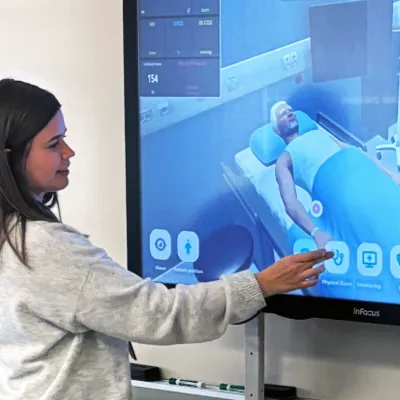The Crucial Role of Teamwork in Health CTE Programs
Teamwork is crucial in healthcare professions, playing an important role in delivering superior patient care, enhancing job satisfaction among healthcare providers, and boosting the overall efficiency and effectiveness of healthcare.
By combining the expertise of diverse healthcare professionals, teamwork guarantees that patients receive holistic care that addresses all aspects of their health. Collaborative efforts allow for the early identification and correction of errors, significantly reducing the risk of medical mistakes and improving patient safety.
Communication as pillar of teamwork
Effective communication among team members is a fundamental aspect of teamwork, ensuring that critical patient information is shared. This leads to well-informed decisions and better patient outcomes.
Additionally, teamwork fosters coordination, ensuring that all team members are aware of their roles and responsibilities. It minimizes miscommunication and optimizes continuity of care, providing patients with consistent and coordinated services throughout their healthcare journey.
Being part of a team
High school and Career and Technical Education (CTE) programs play a vital role in teaching teamwork and preparing students for academic success and future careers. Learning these soft skills early is essential as most careers today require effective teamwork, especially in healthcare.
Working in teams helps students develop critical thinking and problem-solving skills. They learn to communicate effectively, debate ideas, and provide constructive feedback. Navigating different personalities and work styles enhances their interpersonal skills and emotional intelligence, crucial for personal and professional relationships. It also has a great impact on self-reflection and self-awareness, helping students understand their strengths and weaknesses within a group setting.
Being part of a team gives students a sense of connection and community, improving their overall well-being and engagement in school.

Virtual Patients: Immersive virtual patients simulations for team building
Body Interact aids high school students in developing and understanding the importance of teamwork through realistic virtual patient scenarios. Students collaborate to diagnose and treat virtual patients by engaging in lifelike medical cases, simulating real-world healthcare teamwork.
Teachers can leverage this simulation methodology to foster essential teamwork skills by assigning students different roles such as doctors, nurses, and technicians. This promotes an understanding of interdependence and the importance of each team member’s contribution.
Challenging your students to work through a virtual patient scenario as a team enhances verbal communication as they must communicate ideas and listen to peers. It also sharpens critical thinking and decision-making under pressure, offering a realistic preview of the collaborative nature of healthcare professions and preparing students for their future careers.
“The simulations not only deepen students’ medical knowledge but also enhance their communication and teamwork skills.
They quickly realize the importance of effective collaboration, as they witness how efficient communication and coordinated efforts can significantly impact patient outcomes.”
Dr. Sindhu Kaimal at Zuni High School (Black Rock – New Mexico, US)
References
Babiker A, El Husseini M, Al Nemri A, Al Frayh A, Al Juryyan N, Faki MO, Assiri A, Al Saadi M, Shaikh F, Al Zamil F. Health care professional development: Working as a team to improve patient care. Sudan J Paediatr. 2014;14(2):9-16. PMID: 27493399; PMCID: PMC4949805.
Rosen MA, DiazGranados D, Dietz AS, Benishek LE, Thompson D, Pronovost PJ, Weaver SJ. Teamwork in healthcare: Key discoveries enabling safer, high-quality care. Am Psychol. 2018 May-Jun;73(4):433-450. doi: 10.1037/amp0000298. PMID: 29792459; PMCID: PMC6361117.
De Prada, E., Mareque, M. & Pino-Juste, M. Teamwork skills in higher education: is university training contributing to their mastery?. Psicol. Refl. Crít. 35, 5 (2022).
https://doi.org/10.1186/s41155-022-00207-1









